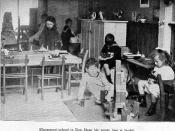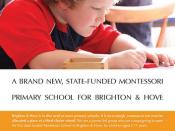Montessori Method � PAGE �8�
The Montessori Method
Judge Edward Singleton
Instruction Television College
Prof. Eileen Roth
PSY 41 - Lifespan Psychology
July 7, 2007
�
When Dr. Maria Montessori became the director of a school for mentally-handicapped children, she exposed them to an environment that was highly conducive to learning. After two years, the children, who had formerly been labeled uneducable, were able to pass a test with normal children. This dramatic success led her to study how normal children learn. She reasoned that if mentally disabled children could be brought up to the level of normal, then normal children could excel. Following a two-year study of anthropology and psychology, she took over a school in the slums of Rome, where her use of materials and resources led to optimal self-learning on the part of the children. She hired an assistant who was directed not to teach, but instead to demonstrate use of the materials to children who were interested and to show them how to keep their schoolroom clean and orderly.
What Dr. Montessori called auto-education (the natural way children learn) gained world attention because of its spectacular results.
The Montessori Method is based on the idea that every child has a natural way of learning. If encouraged and nurtured, the child will flourish and become an educated person:
"Supposing I said there was a planet without schools or teachers, where study was unknown, and yet the inhabitants-doing nothing but living and walking about-came to know all things, to carry in their minds the whole of learning; would you not think I was romancing? Well, just this, which seems so fanciful as to be nothing but the invention of a fertile imagination, is a reality. It is the child's way of learning. This is the path...


